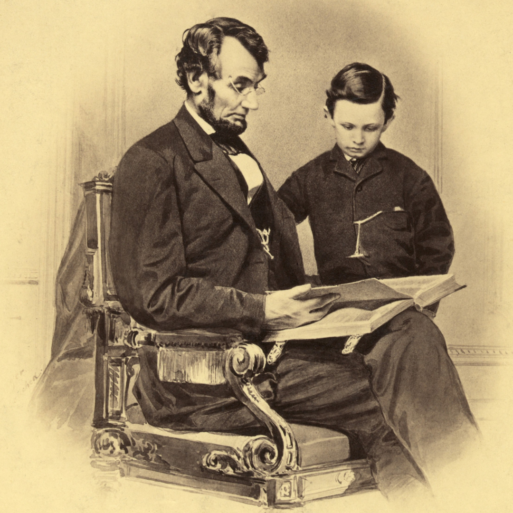
Oh! why should the spirit of mortal be proud!
Like a light-fleeting meteor, a fast-flitting cloud,
A flash of the lightning, a break of the wave,
He passeth from life to his rest in the grave.
The leaves of the oak and the willow shall fade,
Be scattered around and together be laid;
And the young and the old, and the low and the high,
Shall moulder to dust, and together shall lie.
[…]
So the multitude goes, like the flower or the weed
That wither away to let others succeed;
So the multitude comes, even those we behold,
To reap every tale that has often been told.
For we are the same that our fathers have been,
We’ve seen the same sights that our fathers have seen;
We drink the same stream, and we see the same sun,
And we run the course that our fathers have run.
“Mortality”: One of Abraham Lincoln’s Favorite Poems
In his book “Brief History of Gilead, and Prose and Poetic Writings,” George W. Chapman related a story as told to him by the American painter F. B. Carpenter. The artist had been commissioned to paint a portrait of Abraham Lincoln during his tenure in the White House, and they spent many evenings together passing the time by discussing literature. As Carpenter related, one night Lincoln, “relapsing into a sadder strain,” recited a favorite poem from memory. Although Lincoln was unable to recall who had written it, Carpenter faithfully transcribed the poem, and as it turns out, it was “Mortality” by William Knox.

Abraham Lincoln reading the Bible to his son Tad, in 1865.
Credit: The Everett Collection
Often reprinted in nineteenth century newspapers with the title, “O! Why Should the Spirit of Mortal Be Proud,” the poem was originally published in Knox’s 1824 book Songs of Israel.
Comforting Words
Knox’s poetry often reflected deeply religious sentiments, which is hardly surprising knowing the Victorian penchant for moralizing, uplifting poems. In “Mortality,” though, Knox was less focused on heavenly pursuits; instead he wished to contemplate how death is, essentially, the great equalizer:
The saint who enjoy’d the communion of Heaven;
The sinner who dared to remain unforgiven;
The wise and the foolish, the guilty and just,
Have quietly mingled their bones in the dust.
For Knox, the concept of mortality almost seems to be a comforting thought. Because everything ultimately dies and returns to the earth, there is no reason for an individual to expect a different fate. It follows, too, that if everyone’s fate is death, there is less reason to grieve. It’s almost like his poem is an eloquent shrug of the shoulders; like Knox took 14 stanzas to beautifully say “it is what it is.”
Then, he essentially reasons that because our lives are so short, they are almost unremarkable. The mortal soul shouldn’t be “proud,” because we think the same things our predecessors did, and feel the same feelings, and when we die we return to the same layer of dust. Knox isn’t disparaging life, though. He’s merely reflecting upon the hubris of people thinking that our existence is the end-all and be-all of our universe. In this way, the poem is written as if Knox were considering things from God’s point of view: Our lives are precious but brief, and should be valued but not idolized.
Yea, hope and despondency, pleasure and pain,
Are mingled together in sunshine and rain;
And the smile and the tear, and the song and the dirge,
Still follow each other like surge upon surge.
‘Tis the wink of an eye, ‘tis the draught of a breath,
From the blossom of health to the paleness of death,
From the gilded saloon to the bier and the shroud —
Oh! Why should the spirit of mortal be proud?

 “Mortality” by William Knox
“Mortality” by William Knox


 How Dare You Die Now!
How Dare You Die Now!
 Debating Medical Aid in Dying
Debating Medical Aid in Dying
 “Help Me, Helen”
“Help Me, Helen”














